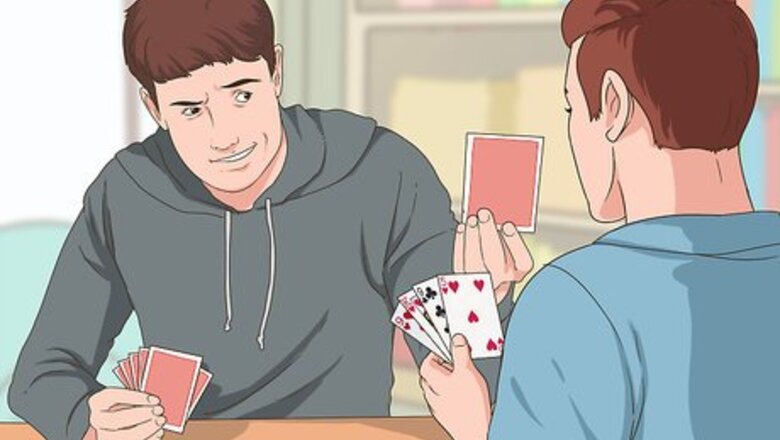
views
Finding Indoor Activities
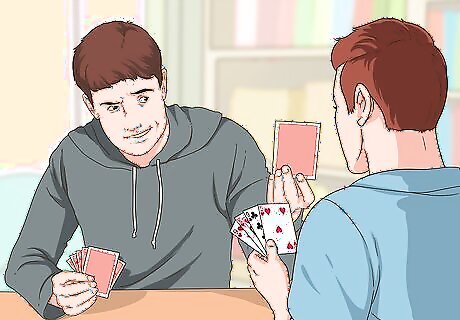
Play games. Whatever game you find will give you a simple option for passing the time. All you need is a deck of cards, a board game, or your imagination. Use this time to learn a new game or reconnect with an old one. Whether this be learning one of the endless newer board game options such as Cards Against Humanity or playing an old classic such as Monopoly, grabbing your family or friends for a session can entertain and ease tension between you. If you have a sibling, take the time to play with them. Even something as simple as hide-and-seek or tag is a change of pace. Card games are an old standard for passing time, but there are many variations on games such as Solitaire that you can learn. The particularly ambitious can even try inventing their own game. You’ll keep your mind active, but who knows? You may come up with a new tradition. Video games, if they haven't been confiscated, are another simple option with the potential for large time investment and enjoyment.
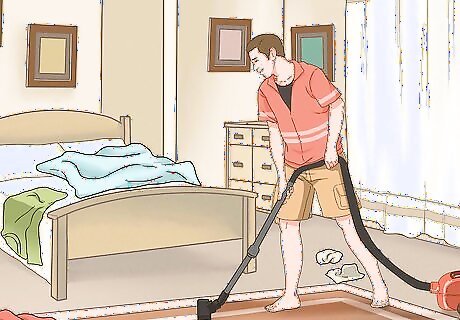
Clean your room. No, it doesn’t sound fun, but it is a useful way to spend the time. Maybe your room is messy and you can’t walk without stepping on dirty shirts, or your favorite bracelet vanished from the jewelry box. Managing your space is an efficient use of your time and will impress your parents. The act of cleaning gets you active, and when your room smells nice and is organized you'll feel happier. You can put on music, a podcast, or an audio book to further distract your mind from you grounding and your chores. You can also do other chores around the house and use them to ask for extra allowance or less time being grounded.

Catch up on homework. As with cleaning, it isn’t a fun way to pass the time, but it’s a useful way to do so. Being stuck in your house or your room gives you a perfect time with reduced distractions to get done the work you’re going to have to do anyway to prepare for class. Getting the work done now means that later on you’ll have more time to do what you want, rather than having to stop and finish homework at the last minute. Preparation means better grades and better grades means impressing parents, making them more lenient, and reducing grade-related opportunities to be grounded.

Read or listen to books. Because of being busy with schoolwork, friends, and social media, many people miss out on the adventures the literary world used to offer them. Have you been eyeing that new book your friends have been discussing? Now is the perfect time to begin it, or even go back into the reads that once inspired you. For those that don’t have books or dislike the physical act of reading, audio books are now widely available at libraries, bookstores, or online shops such as audible.com. Audio books are combinable with mindless activities such as chores. Even if the book doesn’t take you somewhere else by imagination, hearing the speaker can keep you daydreaming, which passes the time.

Listen to podcasts to learn something new. Podcasting is another electronic platform that has exploded due to the Internet. Virtually anyone can learn to make one, so there’s plenty of variety out there, from storytelling to music to learning a new language. What you want to get out of this time is entirely up to you! If electronics have been banned for you, ask your parents to help you find some podcasts relating to your interests or download them to a device such as an iPod ahead of time. Search a platform such as iTunes. The program’s store keeps a healthy supply of podcasts, and most of them are free.

Draw or paint. You don’t need to be in class to doodle, and you don’t need a canvas and expensive paint to make art. Even if it means grabbing a pen and a piece of paper, this is a great way to pass the time while expressing creativity. Material is cheap and easy to find in retail stores such as Walmart. This includes adult coloring books, colored pencils, paints, and various pens you can keep on hand for use before and after grounding. Let your imagination roam free. This act of expression allows you to draw out your frustrations, which can help you come up with new ideas for activities and calm you down to the point that you begin to feel happier.

Write. Writing is the same as other artistic pursuits in health benefits that come from the freedom of expression. You don’t need to be a great writer or have ambition to do this. All you need is paper and a writing utensil. Begin a journal by writing down what you’re feeling or how your day went. This means of expression has the effect of calming you and enabling you to work through your thoughts. Write a story. If you have a concept in mind, let loose without fear of judgment. Any ideas, even those scribbled down in a journal, can lead your writing to places you never expected to go. Brainstorm and write down a list of ideas that you consider fun or things that you have always wanted to do but never done.

Listen to music. A first choice for many stuck in grounding, music has been shown to have such benefits as improving mood and relieving stress. The kind of music you use depends upon your own tastes, and any type of music works. If you have access to a radio or other device that plays music, make use of it. Your first instinct will be to blast out the sound so loud your parents can hear. Avoid getting on their nerves and provoking an argument. Consider carefully how the music affects you. Any type of music, dependent on personal taste, can lead to good feelings, but if for example that aggressive rap song you like often leads you to feeling angry, avoid it. If you're a musician, even a beginner, play an instrument. The act of making your own music relieves tension and gives you practice time.

Find a new hobby. If you’ve got nothing else to do, here’s an opportunity to at least research an activity you’d like to try. Investigate a pursuit such as cooking and try it out to see if you find it fun. Not only does this fill the time during a grounding, it can be the basis for a hobby you pursue long-term. If you have Internet access or books on the subject, use these to collect information to figure out which hobby is right for you and how to get started. Ask your parents for help. They can get you started, even showing you the basics of your hobby if they have any experience. This is even more important for something like cooking if you need permission to touch the stove.

Play with your pet. Your pet is your friend and family, but life is so busy it’s easy to forget to give them attention. They’ll be happy to have you around and you’ll be even happier playing together. Use toys such as danglers for cats. You’ll enjoy the way your pet reacts and gets entertainment out of such a simple activity. Get down on their level. Roll around with your dog or cat. Let your bird rest on your shoulder. Put your rodent in a rolling ball. Being close to your pet helps you relax.
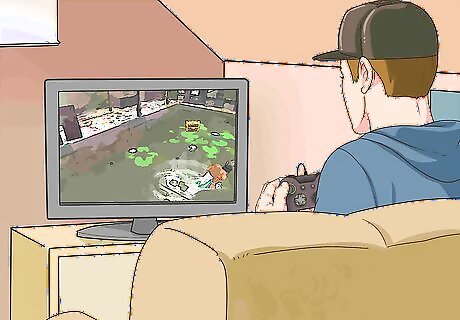
Use your electronics. You’re stuck inside, but that doesn’t necessarily mean all of your electronic devices are gone. In fact, spending more time inside may mean doing the opposite of what you normally do, and for some this means getting more invested in technology. Parents may also allow you to keep devices in your room. If you have a television, channel flip to find a new movie or show or rewatch an old favorite. If you have Internet access, search for new hobbies, music, podcasts, or even participate on social media. Try a video game you have yet to find the time to play. Use your iPod, radio, or similar device to play music.
Finding Outdoor Activities
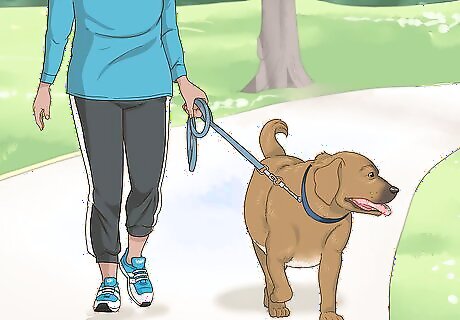
Walk your dog. Like playing with your dog, walking your dog is good for you and your dog too. Dogs are supposed to get an hour of daily exercise, but walking also allows the both of you to get outside and see your neighborhood. Take a new route around the neighborhood. Go explore places you haven’t yet had a chance to explore and meet new people.

Ride your bike. Bike riding is a great mode of transportation and exercise. It’ll force you to get away from the temptation of sitting around at home and allow you to work off your frustration of being grounded, even if you're permitted to only ride up and down your street. Ride to a place you haven't been in a while or go find new sites to revisit later. Explore your surroundings. If permitted, go on a bike ride with your friends or your family. The exercise and company will help you feel better.
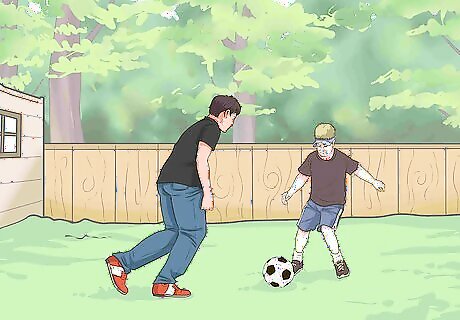
Play in the yard. You’ve got an old ball or a jump rope you haven’t touched for years. Recall the days on the playground when you first learned double dutch or organize a game of kickball. Such physical activities lead to better health, the removal of negative feelings, and can be shared with others. Grab a sibling, a friend, or a parent who isn't busy. The company you keep will increase your enjoyment and give you someone with which you can work off your frustration. Anyone involved in sports can use this time to practice. A basketball player for instance can practice shooting free throws. In winter months, transition to winter activities. Get a ball and hockey sticks. Skate around on ice. Bundle up and build a snowman.

Take pictures. You don’t have to be a budding photographer to take pictures, but stepping outside and doing so allows you to practice your artistic expression while seeing the sights in your area that you usually ignore. Use a cell phone or ask your parents to borrow a camera. Even a cheap, disposable camera will do. Use your imagination when choosing subjects. It doesn’t matter if you choose to take pictures of flowers, snow formations, or your pet. This is your time, and you should choose what captures your eye. These pictures can be used later. For instance, you can put them into a photo album online or offline or make a collage.
Dealing with Your Parents

Let your emotions subside. It’s usual for you to feel upset about being grounded, but taking your anger out on a parent will make you feel more miserable. Go to a room where you can be alone. Avoid contact with your parent until you feel ready to speak to them. To calm yourself, do an activity or two first. Keeping yourself physically and mentally occupied distracts you and you may even enjoy the activity enough to feel happier. If possible, you can also choose to talk to a friend during this time. They'll listen to your story and may even give you insight. Keep in mind that your parent may feel angry too, so give them time to recover.

Apologize verbally. Put yourself in your parent’s position and try to understand why you’ve been grounded. Chances are your parents didn’t want to punish you. By understanding why they did, though, you can express more sincere remorse that at the very least establishes better communication that will make you feel happier. Speak your apology out loud. This is difficult to do at times, but a verbal apology carries more weight. Adopt a proper tone. Keep your voice low, clear, but authentic. Make your apology meaningful by showing you understand what you did wrong and will do differently next time. Instead of saying you’re sorry for kicking a ball in the house, say, “I’m sorry I broke your lamp. I shouldn’t have been kicking the ball in the house. Next time I’ll play outside so I don’t upset you by breaking the rules.”
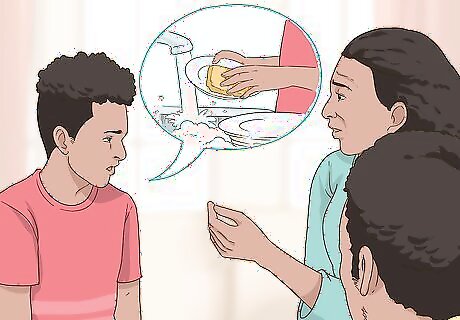
Ask how you can reduce the grounding. Many parents are open to making a deal. Chances are they have some household chores they haven’t finished. By sparing them the effort, you ingratiate yourself because you’re doing something for them, and it makes you look apologetic. The activity and the reduced grounding time will make you feel happier. For example, offer to do the dishes. Your parent may exchange that work for a few days off your grounding time. Some parents are strict, or the offense you committed too serious to them to be forgiven through deals. You’ll have to deal with this by waiting out the grounding.

Talk to your parent. Some parents are more open than others, so use your discretion as to whether or not discussion is beneficial. Those that are willing to listen will be more willing to end your grounding if they believe you understand what you did wrong and have learned from it or at least have a discussion with you that takes away some of your anger and sadness. Discussions should always be calm, quiet, and open. As soon as you resort to anger and screaming, you cause your parent to retreat into their anger and authority. This causes them to extend the grounding and you to feel bad all over again. Tell them your side of the story and listen to theirs. Chances are you’ll reach a middle ground, erasing hurt feelings and tension in the process. Strict parents may be concerned with expressing their authority. You may have no choice but to wait out the grounding.















Comments
0 comment